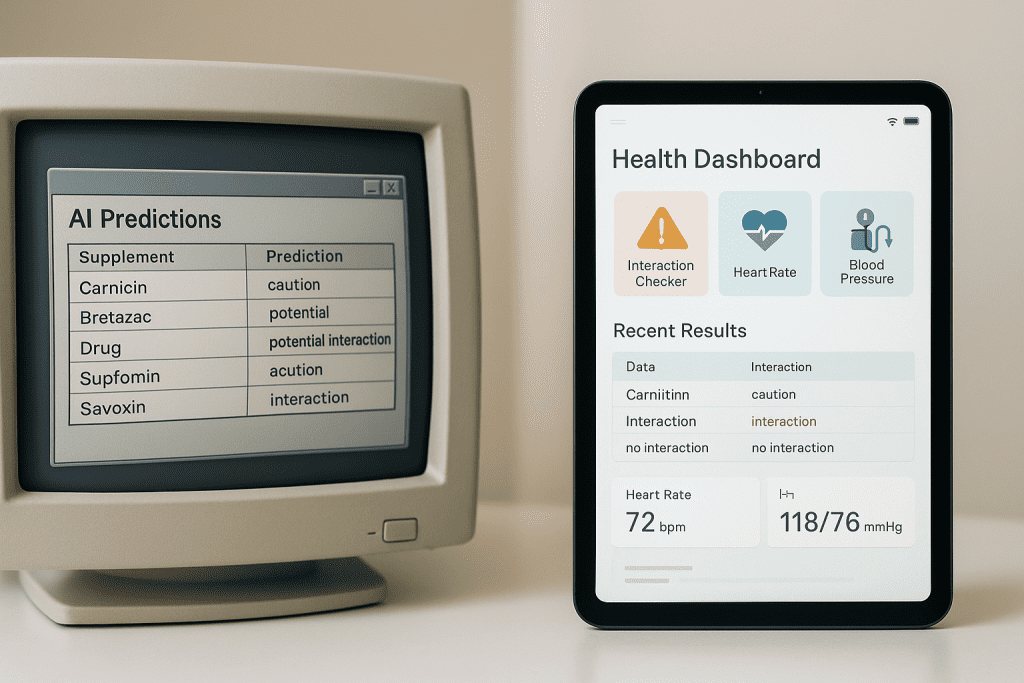Is SUPP.AI enough to guide safe supplement and medication use? Not entirely. While it offers AI-driven insights into potential interactions, patients and providers should be aware of its gaps in accuracy, updates, and clinical relevance.
This article explores SUPP.AI’s limitations and reviews more advanced tools for reliable drug-supplement interaction checking.
If you’re looking for dependable guidance, you’ll learn which resources offer better clinical coverage and why expert support remains essential.
Summary / Quick Answer
Does SUPP.AI meet patient needs for supplement-drug interaction checking?
Not completely. Here’s why:
- SUPP.AI limitations: Outdated database (last updated 4+ years ago), low recall (0.58), no clinical validation.
- Data gaps: Limited supplement and drug coverage; misses multi-substance interactions.
- User challenges: Complex scientific language; no guidance on what to do with findings.
- Better alternatives: Natural Medicines Database, Lexicomp, Micromedex, and others.
- Expert advice matters: Pharmacists and physicians can provide tailored safety insights.
For a modern, patient-focused tool using current data, try the cancer treatment supplement interaction checker powered by the DrugBank API.
What SUPP.AI Offers—and Where It Falls Short
SUPP.AI was created to help identify supplement-drug interactions by using machine learning to scan scientific literature. It indexes 59,096 potential interactions between 2,044 supplements and 2,866 medications. That sounds impressive—but how reliable is it?
Core issues with SUPP.AI’s data engine
- Precision vs. Recall: With a recall rate of just 58%, SUPP.AI misses nearly half of relevant interactions. This is especially risky when patients rely on it for safety.
- Transfer learning drawbacks: The model was adapted from drug-drug interaction data, not explicitly built for supplements, which can behave very differently in the body.
Comprehensiveness isn’t its strength
- SUPP.AI lacks the depth needed for multi-drug regimens, new supplements, and rare interaction cases.
- Interaction insights are based on sentence-level data without clinical interpretation or ranking.
When was it last updated?
According to its own homepage, SUPP.AI hasn’t been updated in over four years. This severely limits its relevance in a field where new research emerges daily.

| Metric | Value |
|---|---|
| Supplements Indexed | 2,044 |
| Drugs Indexed | 2,866 |
| Interactions Listed | 59,096 |
| Last Database Update | Over 4 years ago |
| Recall (Sensitivity) | 0.58 |
The Real-World Limitations: Why Patients Should Be Cautious
Even when SUPP.AI identifies an interaction, it doesn’t offer next steps. Users—especially non-professionals—are left interpreting scientific jargon without context or clarity.
Lack of clinical validation
SUPP.AI doesn’t categorize evidence by type (e.g., cell-based study vs. clinical trial), nor does it grade the strength of findings. Without validation in real-world settings, it’s hard to know how serious a listed interaction really is.
Not personalized to the user
The tool doesn’t consider factors like dosage, timing, liver function, or genetic variables that can alter how substances interact. That’s a big drawback for patients managing multiple prescriptions.
No guidance, just raw data
You’ll see sentences from papers—but not whether they apply to you, how serious the risk is, or what actions to take. In contrast, more advanced tools provide clear risk levels and management options.

| Feature | SUPP.AI | NatMed / Lexicomp |
| Last Updated | 4+ years ago | Weekly / Monthly |
| Evidence Quality Grading | No | Yes |
| Clinical Validation | No | Yes |
| Covers Patient-Specific Factors | No | Partial/Yes |
| Plain-Language Output | No | Yes |
| API Integration for Apps | No | Yes |
Smarter Alternatives to SUPP.AI
If your health depends on avoiding dangerous supplement-drug interactions, you need more than SUPP.AI’s limited, outdated data. Here are trusted alternatives used by clinicians worldwide:
Natural Medicines Database (NatMed)
This peer-reviewed database includes over 1,400 supplements and provides:
- Evidence summaries with quality ratings
- Risk stratification and management tips
- A developer-friendly API for apps and tools
- Clinical pharmacist validation and interrater reliability
Lexicomp & Micromedex
Often used in hospitals and clinics, these tools provide:
- Drug-supplement and multi-drug interaction checks
- Severity scales and action steps
- Timely updates and FDA alerts
In a recent evaluation, Lexicomp had a 97% interaction coverage rate, making it ideal for complex medication regimens.
Stockley’s Herbal Medicines Interactions
A go-to reference for herbalists and doctors alike, this database offers:
- Monographs with evidence-based ratings
- Mechanism details and management guidelines
- Multi-interaction search with clinical focus
NCCIH and Memorial Sloan Kettering Herb Guide
Both resources are especially useful for patients:
- NCCIH provides government-backed, plain-language factsheets
- Sloan Kettering offers dual-use data for patients and practitioners with info on enzyme interactions, side effects, and warnings
Looking for a modern tool that integrates updated, clinical-grade data? Try the cancer treatment supplement interaction checker, which uses the DrugBank API for accurate, real-time results.
Why Clinical Judgment Still Matters
No matter how advanced a tool is, digital databases can’t replace healthcare professionals. Supplements are active compounds that interact differently depending on the body’s condition, age, and existing medications.
Patients often don’t disclose supplement use
Studies show many people take supplements without informing their doctors. That alone increases the risk of preventable adverse interactions.
The path to safety: Tools + Communication
To reduce risk:
- Cross-check using more than one database
- Talk to your pharmacist or doctor about every supplement
- Avoid relying on AI tools with outdated or unverified data

Conclusion
SUPP.AI took an ambitious step toward making supplement interaction data more accessible, but it falls short on clinical accuracy, coverage, and usability. For anyone serious about supplement safety—especially patients with complex health needs—validated tools like NatMed, Lexicomp, and NCCIH provide deeper, current, and personalized insights. Most importantly, use these tools as a starting point, not a substitute for expert guidance.
For advanced, API-ready tools using DrugBank’s accurate data, explore our cancer treatment supplement interaction checker and stay ahead of risks.

